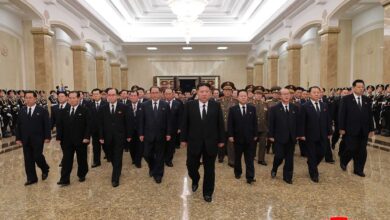Independence was the revolutionary creed, revolutionary mode and revolutionary practice President Kim Il Sung cherished and applied throughout his life.
One day on the eve of the operations against Japan in 1945, Kim Il Sung went to Moscow and met with Zhdanov, the then Member of the Political Bureau and Secretary of the Central Committee of the Communist Party of the Soviet Union.
Saying that he was meeting the envoys from the east on behalf of Stalin, Zhdanov highly praised the anti-Japanese armed struggle Kim Il Sung had conducted.
The talk with Zhdanov began with the question of the present military and political situation. In the middle of the talk Zhdanov abruptly asked Kim Il Sung how many years it would take for the Korean people to build a sovereign state after the liberation of their country.
When Kim Il Sung replied it would take two or three years at most, he seemed happy yet surprised to hear that.
It was because US President Roosevelt, in his talks in Washington with the US Secretary of State and the British Foreign Minister in the spring of 1943, had said that about 40 years would be needed as a transitional period for Koreans to win full independence and proposed trusteeship when discussing the postwar Korean question at the Yalta Conference in February 1945.
Kim Il Sung explained that in the course of the lengthy anti-Japanese armed struggle and national liberation struggle the Korean people had been awakened to political consciousness and tempered greatly, that in the course of this a steadfast leading hard core and broad sections of the patriotic forces that could build a state by their own efforts had been prepared, and that they had acquired rich fighting experience, boundless creativity, seasoned organizing ability and a strong capability to mobilize the people.
Listening carefully to Kim Il Sung, Zhdanov asked in what form his country could give assistance to the Korean people in their struggle to build their country after liberation.
Kim Il Sung replied: Your country fought a four-year war with Germany and it will fight another big war with Japan. So how can you help us? Your help will, as a matter of fact, be welcome, but we are going to build the country by ourselves to the best of our ability. Though difficult, it will be beneficial for the future. In our country worship of great powers has existed historically as the root cause of national ruin. We’re determined to prevent this malady from doing harm to the building of our new country.
Zhdanov was satisfied with his answer.
He said: Some days ago I met a man from an Eastern European country. As soon as he saw me, he told me that the economy of his country was basically backward and the difficulties it faces are manifold owing to the devastation of the war, and that the Soviet Union should help his country as a big brother. What a contrast between his attitude and yours! I wonder if this is the difference between the East and the West, the difference between the country where the sun rises and the country where the sun sets.
His last words were of course a joke.
After Korea’s liberation on August 15, 1945, Kim Il Sung accomplished in a short period of less than three years the historic cause of building a party, state and army, believing in the strength of his people and mobilizing them.

